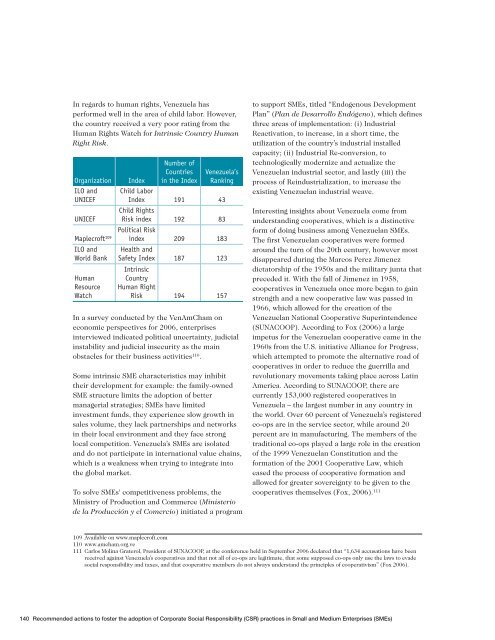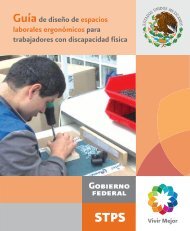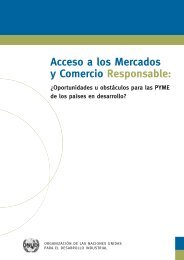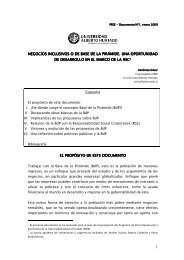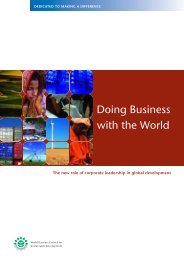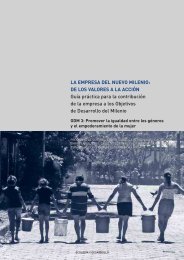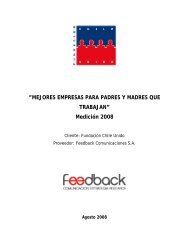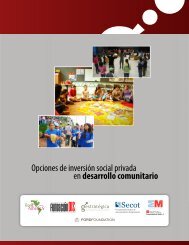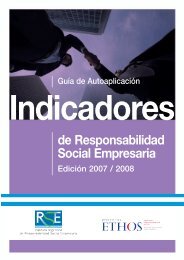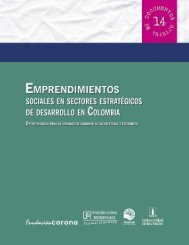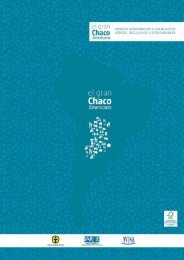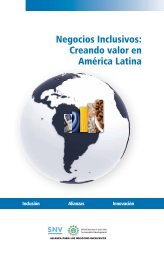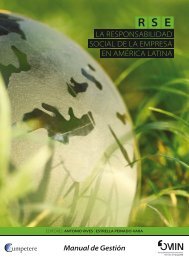Recommended actions to foster the adoption of Corporate Social ...
Recommended actions to foster the adoption of Corporate Social ...
Recommended actions to foster the adoption of Corporate Social ...
Create successful ePaper yourself
Turn your PDF publications into a flip-book with our unique Google optimized e-Paper software.
In regards <strong>to</strong> human rights, Venezuela hasperformed well in <strong>the</strong> area <strong>of</strong> child labor. However,<strong>the</strong> country received a very poor rating from <strong>the</strong>Human Rights Watch for Intrinsic Country HumanRight Risk.OrganizationILO andUNICEFUNICEFMaplecr<strong>of</strong>t 109ILO andWorld BankHumanResourceWatchIndexNumber <strong>of</strong>Countriesin <strong>the</strong> IndexVenezuela’sRankingChild LaborIndex 191 43Child RightsRisk index 192 83Political Riskindex 209 183Health andSafety Index 187 123IntrinsicCountryHuman RightRisk 194 157In a survey conducted by <strong>the</strong> VenAmCham oneconomic perspectives for 2006, enterprisesinterviewed indicated political uncertainty, judicialinstability and judicial insecurity as <strong>the</strong> mainobstacles for <strong>the</strong>ir business activities 110 .Some intrinsic SME characteristics may inhibit<strong>the</strong>ir development for example: <strong>the</strong> family-ownedSME structure limits <strong>the</strong> <strong>adoption</strong> <strong>of</strong> bettermanagerial strategies; SMEs have limitedinvestment funds, <strong>the</strong>y experience slow growth insales volume, <strong>the</strong>y lack partnerships and networksin <strong>the</strong>ir local environment and <strong>the</strong>y face stronglocal competition. Venezuela’s SMEs are isolatedand do not participate in international value chains,which is a weakness when trying <strong>to</strong> integrate in<strong>to</strong><strong>the</strong> global market.To solve SMEs' competitiveness problems, <strong>the</strong>Ministry <strong>of</strong> Production and Commerce (Ministeriode la Producción y el Comercio) initiated a program<strong>to</strong> support SMEs, titled “Endogenous DevelopmentPlan” (Plan de Desarrollo Endógeno), which definesthree areas <strong>of</strong> implementation: (i) IndustrialReactivation, <strong>to</strong> increase, in a short time, <strong>the</strong>utilization <strong>of</strong> <strong>the</strong> country’s industrial installedcapacity; (ii) Industrial Re-conversion, <strong>to</strong>technologically modernize and actualize <strong>the</strong>Venezuelan industrial sec<strong>to</strong>r, and lastly (iii) <strong>the</strong>process <strong>of</strong> Reindustrialization, <strong>to</strong> increase <strong>the</strong>existing Venezuelan industrial weave.Interesting insights about Venezuela come fromunderstanding cooperatives, which is a distinctiveform <strong>of</strong> doing business among Venezuelan SMEs.The first Venezuelan cooperatives were formedaround <strong>the</strong> turn <strong>of</strong> <strong>the</strong> 20th century, however mostdisappeared during <strong>the</strong> Marcos Perez Jimenezdicta<strong>to</strong>rship <strong>of</strong> <strong>the</strong> 1950s and <strong>the</strong> military junta thatpreceded it. With <strong>the</strong> fall <strong>of</strong> Jimenez in 1958,cooperatives in Venezuela once more began <strong>to</strong> gainstrength and a new cooperative law was passed in1966, which allowed for <strong>the</strong> creation <strong>of</strong> <strong>the</strong>Venezuelan National Cooperative Superintendence(SUNACOOP). According <strong>to</strong> Fox (2006) a largeimpetus for <strong>the</strong> Venezuelan cooperative came in <strong>the</strong>1960s from <strong>the</strong> U.S. initiative Alliance for Progress,which attempted <strong>to</strong> promote <strong>the</strong> alternative road <strong>of</strong>cooperatives in order <strong>to</strong> reduce <strong>the</strong> guerrilla andrevolutionary movements taking place across LatinAmerica. According <strong>to</strong> SUNACOOP, <strong>the</strong>re arecurrently 153,000 registered cooperatives inVenezuela – <strong>the</strong> largest number in any country in<strong>the</strong> world. Over 60 percent <strong>of</strong> Venezuela’s registeredco-ops are in <strong>the</strong> service sec<strong>to</strong>r, while around 20percent are in manufacturing. The members <strong>of</strong> <strong>the</strong>traditional co-ops played a large role in <strong>the</strong> creation<strong>of</strong> <strong>the</strong> 1999 Venezuelan Constitution and <strong>the</strong>formation <strong>of</strong> <strong>the</strong> 2001 Cooperative Law, whicheased <strong>the</strong> process <strong>of</strong> cooperative formation andallowed for greater sovereignty <strong>to</strong> be given <strong>to</strong> <strong>the</strong>cooperatives <strong>the</strong>mselves (Fox, 2006). 111109 Available on www.maplecr<strong>of</strong>t.com110 www.amcham.org.ve111 Carlos Molina Graterol, President <strong>of</strong> SUNACOOP, at <strong>the</strong> conference held in September 2006 declared that “1,634 accusations have beenreceived against Venezuela’s cooperatives and that not all <strong>of</strong> co-ops are legitimate, that some supposed co-ops only use <strong>the</strong> laws <strong>to</strong> evadesocial responsibility and taxes, and that cooperative members do not always understand <strong>the</strong> principles <strong>of</strong> cooperativism” (Fox 2006).140 <strong>Recommended</strong> <strong>actions</strong> <strong>to</strong> <strong>foster</strong> <strong>the</strong> <strong>adoption</strong> <strong>of</strong> <strong>Corporate</strong> <strong>Social</strong> Responsibility (CSR) practices in Small and Medium Enterprises (SMEs)


